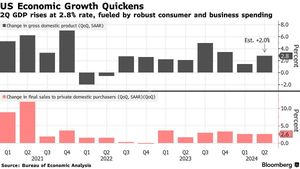Rachel Reeves, the UK Chancellor of the Exchequer, has recently ignited controversy with her economic policies, raising questions about the government’s commitment to the North of England. Amidst allegations of favoring the South and sidestepping key infrastructure needs, the outgoing Conservative administration left unresolved issues, particularly concerning outdated and crumbling structures.
Driving through the dismal northern infrastructure, it is hard to ignore the irony as Reeves announced her endorsement for major airport expansions and ambitions for creating a UK Silicon Valley. Gateshead's iconic Tyne Bridge, now draped in scaffolding due to years of neglect, mirrors the frustrations voiced by northern constituents disappointed by Labour's shifting priorities.
The Chancellor's announcements, particularly about the expansion of Heathrow, have drawn mixed reactions. Some see this ambitious project as potentially beneficial, with hopes for improved connectivity, especially for regions like Newcastle. "The passing of powers and funding...will be key to growth here," said Reeves, as she emphasized the need for local governance to drive economic development once again.
Yet, as Reeves touts growth for the South, many Northerners are understandably resentful. A recent shutdown of the A167 flyover due to safety concerns exemplifies the neglect they feel from Westminster. This key transportation route was abruptly closed last year, causing significant disruption for commuters and holiday shoppers alike, yet no funds have been made available for reconstruction. These realities pose the question: have the commitments made during the election been entirely overlooked?
Indeed, the situation reflects a larger trend where northern voters, who overwhelmingly supported Labour, might feel abandoned. The disappointment stemming from unfulfilled promises laid bare their struggle to compete with the South, where substantial investments have found their way. Expectations were high after the Conservative’s fall from grace and the subsequent resurgence of Labour, yet the retention of past priorities seems to echo the same sentiment: growth isn’t equally distributed.
The situation was exacerbated when AstraZeneca pulled out its plans for establishing a £450 million plant investment, spurning Reeves and her administration's financial strategies. According to GB News, the company cited reduced government support compared to what had been previously promised under the Conservative government as pivotal to its decision. This withdrawal underlines the precarious nature of economic stability promised by the new administration.
Meanwhile, on another front, London City Airport's hopes to amplify passenger numbers have led to accusations of undermining noise regulations. Critics, including representatives from the Hacan East organization, have voiced alarm over new proposals permitting larger aircraft like the Airbus A320 at the airport. John Stewart, chairman of the organization, condemned the airport for using “backdoor tactics” to circumvent these measures, warning of deteriorated conditions for locals should such plans go through. "Conditions would be inevitably worse for locals if the plans were approved," Stewart said.
This turmoil at London City Airport connects back to the broader narrative of Reeves' controversial economic strategies. Once raised, Deputy Prime Minister Angela Rayner's decision last summer to uplift the passenger cap suggests burgeoning growth ambitions, but the backlash from local communities reflects the difficulty of balancing economic goals with public sentiment. It seems, according to critics, the noise around growth is drowning out the voices of concerned residents.
Northerners know all too well the feeling of neglect, burnt by years of inadequate economic investment. The image published last summer about the Tyne Bridge renovation is haunting: as the scaffolding ascends, hopes for substantial improvement falter. What should have been initiatives to bridge the North-South divide now appear to be simply reinforcing it.
The question remains: will Rachel Reeves continue to uphold the aspirations of those who supported her party? Or will Labour's actions reveal a more troubling narrative of systemic inequality between regions? These unanswered queries weigh heavily as Labour embarks on its forthcoming endeavors, especially with fluctuated political values and increasing scrutiny.
Labour may have rebuilt some of its prominence after the electoral setbacks of the past, yet with the scent of controversy now surrounding Reeves, the need to honor previous pledges has never been more pressing. The fateful decision to address the grievances of those feeling cast aside is pivotal if the party wishes to solidify its standing as the voice for all constituents, not merely those whose prosperity fits neatly within its strategic plans.



